When I asked to write about Improvised Dungeons & Dragons at Otherworld Theatre Company, I wasn’t too familiar with the roleplaying game growing up until I got to college and played for the first time at a theater party. But, I’ve always been a big fantasy nerd.
After the show, I had the opportunity to chat with Katie Ruppert and John Doychich, the producers of Improvised Dungeons & Dragons.
・・・
How did you come up with the show? What was the process like?
Doychich: I’m a huge nerd and I love Dungeons & Dragons. And there’s just an obvious intersection between improv and D&D.
Ruppert: And I jumped on it instantly. I said, “Let’s do a show. I love Dungeons and Dragons. I haven’t played in a long time, so I had to revisit it. And when I was communicating to John [Doychich] about the process, the main thing we talked about was “what does our show need to different?” We agreed on roleplayer characters, having well-defined characters with lots of abilities and developing backstories that the audience could choose from. Those were the three core things we decided we wanted to bring to the show.
Then, we did a four-week run at Second City, under a free rent agreement, and that went well. Doing that show helped us grow as artists and. It kinda gave us the tools we needed to decide what we wanted the show to be eventually at Otherworld Theatre. With that run, we used a director instead of a improv coach. With that, it gave us a new look at the show from a theatrical point of view to try and make the improv show feel like a full length production.
What were some obstacles, as producers, getting the show forward?
Ruppert: The show has so much more rehearsal than any other improv show. Our new cast members had to go through six weeks of rehearsal before they went on stage.
Doychich: The actual development, backstory and mechanics of the characters has been a big challenge.
Ruppert: We wanted each character to feel different and complete. So, when they go on stage, we really take our time and make sure they’ve got their own costume pieces and their own sound developed. This show is so complicated; we don’t want anybody to feel like they’re not prepared. We’ve built a lot of tools into the show to make sure that everybody always feels safe.
After the Kavanaugh hearings, why should more women do comedy, especially in the city of Chicago?
Ruppert: When we started the show, I was the only woman on our team who was interested in doing it. And so we brought in Rebecca [Shrom] and Natalie [Mayre]. After the initial run at Second City, they went on to do other projects before coming back.
I always felt very safe when I’m with our male cast members. They are the most awesome crew of men who are respectful, decent and listen to me, not only as a performer but as a producer. When the time came and we realized we wanted to do this long-term, we decided that we needed more women in the cast. Not only is it fair to have more women, but it made our show better because there are so many diverse points of view that you just don’t get when a cast is all men.
Doychich: We’d like the show to be more representative of the world itself, as opposed to just one perspective.
Ruppert: In the fantasy genre, there’s kind of two tropes: a women is either helpless or a tough knight. We worked really hard to make sure nobody was stuck in either of those parts, especially for their roleplayer character. If you want to invest in a trope, that’s fine. But one of the things I love best about the show is that there are six women and they all have really well-developed, fleshed characters. That’s really hard to find in modern shows.
Doychich: Arguably, the women characters are some of the most powerful people in the cast, like Malvolia and Neb, for example.
Ruppert: Everyone has such a nice point of view. There’s something so nice about Liliana, who is very feminine and very, very girly and is still a powerful, kick-butt character.
What is some advice you can offer for up-and-coming improvisers in the city?
Ruppert: I recommend getting a full education in comedy, like from Second City, iO or Annoyance Theatre. When I moved from San Francisco to Chicago, I thought I was the best at everything, but truthfully, I wasn’t. After taking classes, I improved. And to perform in a show like this, you need more skills outside improv. So don’t limit yourself to just taking improv classes; take some scene work classes, take a monologue class…
Doychich: This advice isn’t for just for up-and-coming improvisers, but for any performer: smile and shake hands with everybody. And with that, they’ll remember your positivity and will want to work with you in the future.
Why should folks see your show?
Ruppert: I don’t think you’re going to see anything else like it in this city.
Doychich: We’ve had 30+ shows at this point and I don’t think there’s been a bad one.
Ruppert: One of the theories I’ve always pushed on the cast is “let’s not tell jokes, let’s tell stories.” There’s a lot of great improv in the city, but at some point, it is hard to sustain puns. If you come here, you’re going to see real people, real characters and discover real emotions. There’s something really satisfying about that, that you’re just not going to get from a typical montage.
Improvised Dungeons & Dragons performances occur Sundays at 7 PM Otherworld Theatre Company, 3914 North Clark Street and the First Fridays of every month at 8 PM and 9:30 PM at Blue Box Cafe, 176 East Chicago Street in Elgin, Illinois. The next performance will take place on November 18 at Otherworld Theatre Company. Tickets for shows at Otherworld Theatre Company can be found here. Tickets for shows at Blue Box Cafe can be found here. More information can be found through outonawhimcomedy.com or via email at outonawhimcomedy@gmail.com.


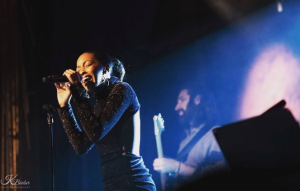
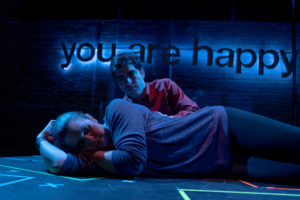
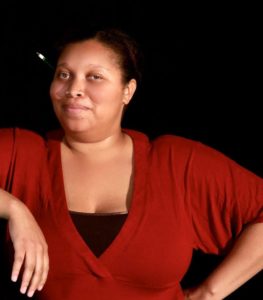
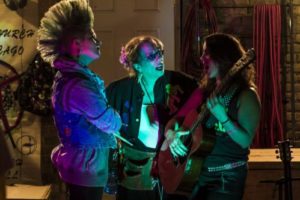
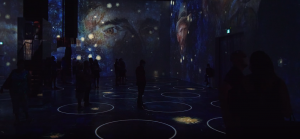



Be First to Comment